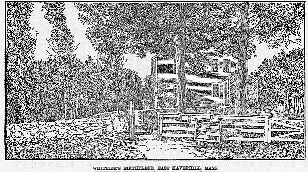John Greenleaf Whittier
II. JOHN GREENLEAF WHITTIER: 1807-1892.
December 17, 1807, -- the year in which Longfellow was born, -- occurred the birth of John Greenleaf Whittier, second in this group of New England poets and one whose memory stands next to that of Longfellow in the affection and reverence of the American people. Unlike Longfellow, Hawthorne, and Emerson, Whittier was neither city-born nor college-bred. In his preparation for life the academic element was entirely lacking. He was a country boy of the genuine New England stock; for one hundred and sixty years his stalwart ancestors had cultivated the Whittier farm, and the very house in which he was born had been built by the great-great-grandfather of the poet in 1688.
The Birthplace.
The birthplace of Whittier lies a few miles from the busy little city of Haverhill, in the northeast corner
of Massachusetts. It was and is a pleasant region, rather lonely, not so ruggedly romantic as that in
which young Bryant learned to commune with nature, yet full of pastoral beauty. "Our old homestead
nestled under a long range of hills," says Whittier; "it was surrounded by woods in all directions save to
the southeast, where a break in the leafy wall revealed a vista of low green meadows, picturesque with
wooded islands and jutting capes of upland. Through these a small brook, noisy enough as it foamed,
rippled and laughed down its rocky falls by our garden side, wound, silently and scarcely visible, to a still
larger stream, known as the Country Brook. This brook in its turn, after doing duty at two or three saw
and grist mills, the clack of which we could hear in still days across the intervening woodlands, found its
way to the great river, and the river took up and bore it down to the great sea."1
The "great river" was the Merrimac, down which Thoreau made his interesting expedition. It was not far to the beaches of Salisbury, Rye, and Hampton, where the poet pitched his imaginary tent, with the great stretch of salt marsh to the westward, the limitless reach of the ocean in the foreground, the high bluff of Great Boar's Head to the north, and to the south the broad mouth of the Merrimac, with the ancient town of Newburyport just beyond. With these localities, Whittier has made his readers familiar.
The Country Boy.
If one would catch a glimpse of Whittier's boyhood, he will find it sketched in The Barefoot Boy; if he would know the spirit of the household, he may find it in Snow-Bound. The farm itself was not a very profitable one; it was encumbered with debt, and strict economy was the law; yet it was a comfortable home, and the picture it left in the poet's memory is an inviting one. The "old rude-furnished room" with its "whitewashed wall and sagging beam," its "motley braided mat" upon the floor, and its ample fireplace ruddy with the flame of crackling logs, was a scene of contentment and homely cheer.
"Shut in from all the world without,
We sat the clean-winged hearth about,
Content to let the north-wind roar
In baffled rage at pane and door,
While the red logs before us beat
The frost-line back with tropic heat.
. . . . .
"And, for the winter fireside meet,
Between the andirons' straddling feet,
The mug of cider simmered slow,
The apples sputtered in a row,
And, close at hand, the basket stood
With nuts from brown October's wood.
"What matter how the night behaved?
What matter how the north-wind raved?
Blow high, blow low, not all its snow
Could quench our hearth-fire's ruddy glow."
Here the winter evenings were passed with story-telling, or talk of guest, or poring over one of the scanty volumes -- perhaps the almanac, or the poems of the Quaker Ellwood, or the Journal of John Woolman,1 or
"The one harmless novel, mostly hid
From younger eyes"2--
a volume of Scott, read privily.
But one bright day the district schoolmaster brought a copy of Robert Burns into this country home and read aloud the songs of Scotland's peasant poet. The New England farmer's son, then fourteen, listened
| Previous chapter | Back | Home | Email this | Search | Discuss | Bookmark | Next chapter/page |
See our FAQ for more details.